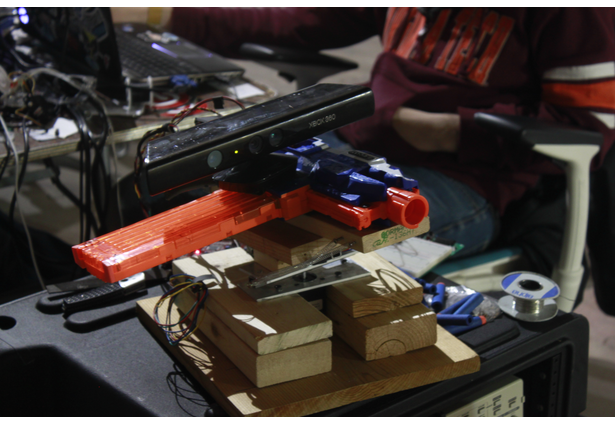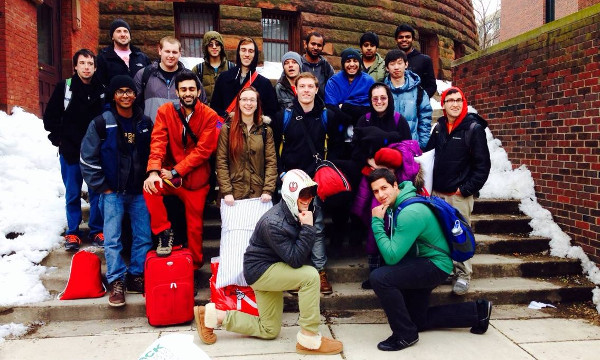Over the past two years, I’ve been to quite a few hackathons (MHacks, Penn Apps, Kent Hack Enough to name a few) and thought I should scribble down some reflections from these experiences from these events so that I can remember them.
Planning Makes Perfect
I’ve gone to a few of these hackathons without any plans as to what I want to make and have failed miserably. In these cases, I’ve gotten bogged down in coming up with an idea, trying to quickly learn a new technology, or just losing hope cause I fall too far behind. That last one becomes quite intimidating when you look around at the people around you: The smartest of the smart working on groundbreaking, amazing stuff that you could only dream to make. And they are doing it with such ease.

They fired this bad boy at judges. It was a sight to behold.
This lead me to an amazing discovery: planning leads to success at hackathons. I realized this while watching the Virgina Tech team at MHacks 2014 make their Nerf Gun Turret. They could not have made this thing in the time constraints without having a solid plan of what to make before showing up. They figured out what they wanted to make, found the parts they needed, and showed up and coded all weekend to make their dreams a reality.
Even though the Nerf Gun Turret is a hardware hack, I think the concept extends to all hacks. Sit down with your teammates, plan out what you want to make, look for libraries that will make development easier, divide tasks to members and go with that. The hackathon is a puzzle: Show up with all the pieces.
Do What You Love
I hate business planning “hackathons” (I’m looking at you, Startup Weekend). These “hackathons” are all about:
- Creating a viable business plan
- Making charts about target markets
- Preparing a pitch deck to woo potential investors
Note how none of these sound like fun (at least not to me). Code isn’t a part of it and it really pares down the ideas that you’re free to implement and attempt to win with. I’m not saying it can’t be done, but I don’t see a viable business plan in a Nerf Gun Turret.
Going to MHacks two years ago made me realize their are two types of hackathons: fun hackathons and poser hackathons. The poser hackathons are like the ones mentioned above. The fun ones allow you to put the hack in hackathon.
I showed up to MHacks 2012 telling my teammates that we need to come up with a commercially viable idea. That we’d need a pitch deck and an idea of target markets. Boy, I couldn’t have been more wrong. Everyone around us was making mind blowing software that, alone, couldn’t make any money, but, on it’s own, made your jaw drop.
Point is this: Go to a hackathon and make something you’d use and enjoy. No one else.
Enjoy The Community
During the 36-48 hours you’re at the hackathon, get to know as many people as you can. Walk the floor and check out what other teams are making. If you dig it, ask them about it. Don’t be shy, they don’t bite.
These people can become long distance friends, Twitter followers you chat with, and possible professional contacts in the future.
Talk Up The Sponsors
These hackathons are impossible without the sponsors giving money to them. This money pays for everything from food to the travel for the individual schools to get there. And chances are that these sponsors have a pretty cool API they want people to do something cool with.
Also they have some pretty sweet swag and are looking to hire hackers from these competitions. Talk them up and if you think you can do something with their API, go for it. If you run into trouble, tweet them and one of their reps will come and help you.
Just Go To One, Already!!!
If anything I’ve described here makes you want to go to one of these fantastic events, go to one. I’ll probably be attending Hack PSU in a few weeks. Hopefully, I’ll see you there.
